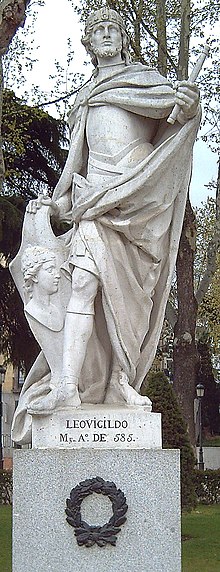Liuvigild
| Liuvigild | |
|---|---|
| King of the Visigoths | |

Statue of Liuvigild in Madrid
(Felipe del Corral), 1750-53 |
|
| Reign | 568 AD-586 AD |
| Predecessor | Athanagild |
| Successor | Reccared |
| Born | c. 519 AD |
| Died | 21 April 586 AD Toledo, Hispania |
| Spouse | Theodosia Goiswinthia |
| Religion | Arianism |
Liuvigild, Leuvigild, Leovigild (Gothic: Liubagilds), or Leovigildo (Spanish and Portuguese), (c. 519 – 21 April 586) was a Visigothic King of Hispania and Septimania from 568 to April 21, 586. From 585 he was also king of Galicia. Known for his Codex Revisus or Code of Leovigild, a unifying law allowing equal rights between the Visigothic and Hispano-Roman population, his kingdom covered modern Portugal and most of modern Spain down to Toledo. He was born circa 525.
In the second year of his reign, king Liuva I declared his brother Liuvigild co-king and heir, assigning him Hispania Citerior, or the eastern part of Hispania, to directly rule over. Both were Arian Christians.
Liuvigild was married twice: first to Theodosia, who bore him two sons Hermenegild and Reccared, and after her death, to Athanagild's widow Goiswintha.
According to the chronicle of John of Biclaro, as co-king Liuvigild initiated the first of several campaigns to expand the territory of the kingdom of the Visigoths, which Peter Heather describes as a "list of striking successes". His first strike was in 570, when he "laid waste the region of Bastetania and the city of Málaga, defeating their soldiers". The following year he captured Medina Sidonia, assisted "through the treachery of a certain Framidaneus." Then, around the time he became sole ruler with the death of his brother Liuva (which occurred in either 571 or 572), seized Córdoba from the Byzantine Empire. During the civil war which ended with Athanagild's rise to power some twenty years earlier, the Byzantines gained control of a stretch of territory in the southeast of the Iberian Peninsula. John of Biclaro notes that upon gaining control of Córdoba, Liuvigild "slaughtered the enemy troops and made the city his own."
...
Wikipedia
